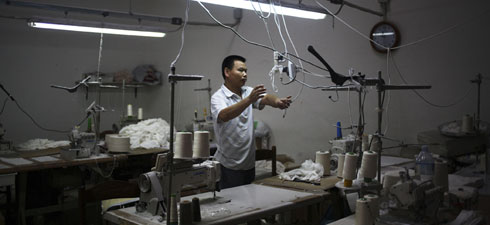Every day, an estimated 50 containers loaded with 800 tonnes of textiles and shoes illegally imported from China and Vietnam arrive in the Czech Republic. Some of this merchandise will be sold on the local market, and the rest will be shipped on to other European countries.
The last few months have seen a dramatic rise in the scale of fraud in Asian textiles. For Czech customs administration spokesman, Jiří Barták, “All the indications are that Asian dealers are using the Czech Republic as a hub for products illegally entering European Union’s single market which allows for the free circulation of goods.”
Authorities are largely unable to identify the “organisers” of this illegal trade who hide behind companies that are often specially created to receive only a few consignments. During the first months of their existence, these companies purchase millions of tonnes of clothing, and then vanish into thin air when required to declare and pay for VAT on sales. Registered owners turn out to be frontmen or foreigners who have left the Czech Republic long before the fraud is discovered.
One of the biggest Chinese criminal organisations operating in Europe
Last May, customs officials succeeded in dismantling the largest illegal import-export operation ever discovered on Czech territory. Managed by a single Chinese gang, it was responsible for an estimated loss of 65 million crowns [2.65 million euros] of tax revenue to the state, and 10% to 15% of illegal trading activity in the country. “It was one of the biggest Chinese criminal organisations operating in Europe. Its members had access to unlimited funds, and were able to lead a life of luxury in the Czech Republic,” explains Aleš Hrubý, a customs officer involved in the investigation.
The network had its HQ in Prague and a smaller operation in Ústecko in the north of the country, close to the German border. At one location, investigators discovered an office staffed by one Chinese woman, who established false invoices to enable dealers to avoid customs charges. The bills sent out by the office were for amounts of less than 15,000 dollars [10,800 euros] while the containers imported varied in value from 80,000 to 200,000 dollars [57,600 to 144 000 euros].
The customs administration, the Ministry of Finance and even the European Union are concerned by the upsurge in illegal trading, and the question of the introducing a new VAT system is now the subject of intense discussion at a Union level. The Austrians and the Germans have proposed a reverse charge mechanism, which would make recipients of goods delivered by foreign companies liable for VAT charges. As it stands, EU member states are only allowed to apply this system for certain categories of goods.
Hungary, a major destination for illegal imports
However, the director of the Czech customs administration, Jan Knížek, believes that “governments should have the option of negotiating opt-outs with the European Union so that they can effectively combat illegal transactions, and force dishonest importers to shift their activities to other countries. In view of the growing scale of these frauds, the EU will have to undertake a major overhaul of the current system for the collection of VAT.”
It has also been suggested that shipping companies be obliged to keep records in a common information system for imported merchandise, which would make it easier for customs officers to monitor the flow of goods.
Three years ago, Hungary, a major destination for illegal imports, solved the problem by making VAT payable when goods were granted customs clearance. Czech authorities are planning on introducing measures along these lines. “The problem,” as Knížek points out, “is that systems of this kind are also a hindrance to the majority of businesses which are honest.”
Italy
Beating Tuscans at the fashion game
Once famed for “Made in Italy” chic, the town of Prato is now home to the largest concentration of Chinese immigrants in Europe, reports the New York Times. Out of a total population of 187,000, some 36,000 immigrants, documented or not, “work round the clock in some 3,200 businesses making low-end clothes, shoes and accessories”. Since 2001, according to the local chamber of commerce, the number of Italian-owned textile businesses has dropped by half. “But what seems to gall some Italians most is that the Chinese are beating them at their own game,” the NYT notes, using “tax evasion and brilliant ways of navigating Italy’s notoriously complex bureaucracy.”
While native enterprises go under, Chinese businesses, repatriating an estimated €1 million of earnings daily, are undermining the exclusive Italian cachet. “Tensions have been running high since the Italian authorities stepped up raids this spring on workshops that use illegal labor,” the NYT writes, “and grew even more when Italian prosecutors arrested 24 people and investigated 100 businesses in the Prato area in late June. The charges included money laundering, prostitution, counterfeiting and classifying foreign-made products as ‘Made in Italy.’"
Was this article useful? If so we are delighted!
It is freely available because we believe that the right to free and independent information is essential for democracy. But this right is not guaranteed forever, and independence comes at a cost. We need your support in order to continue publishing independent, multilingual news for all Europeans.
Discover our subscription offers and their exclusive benefits and become a member of our community now!












